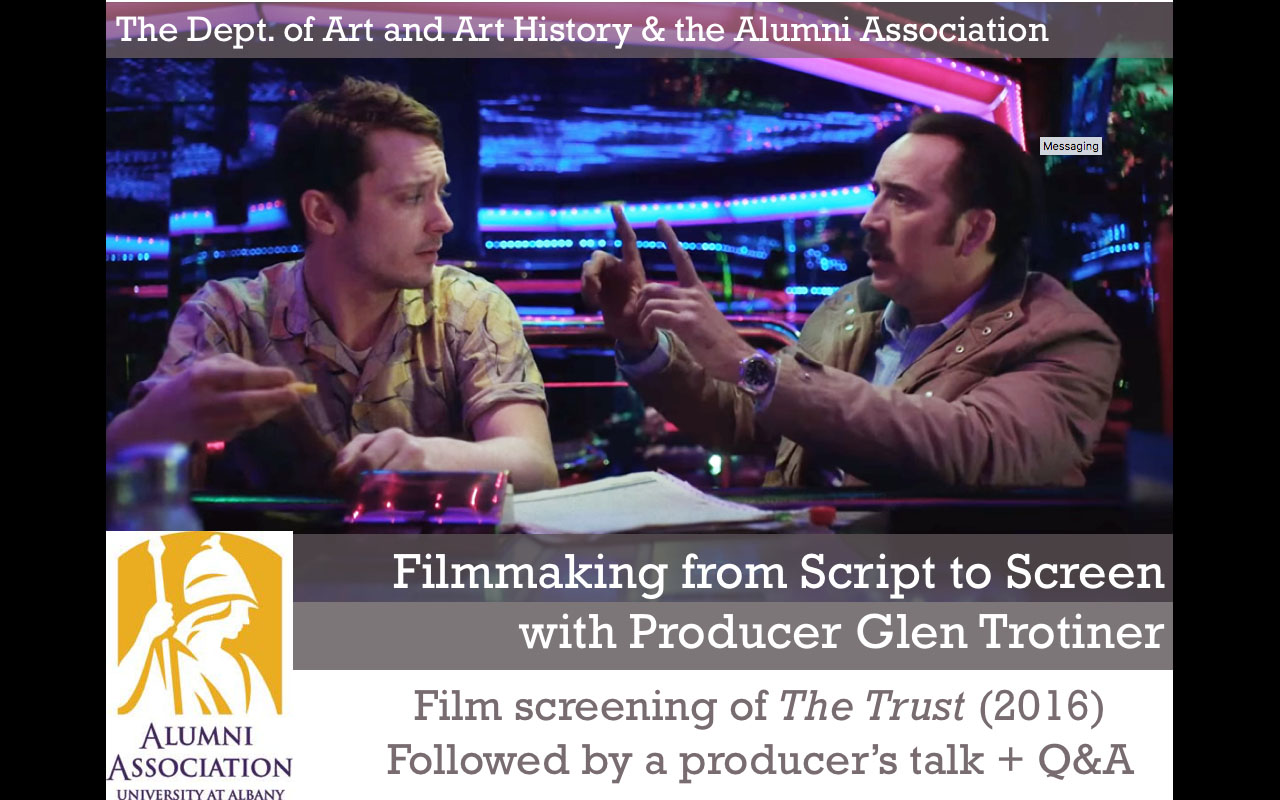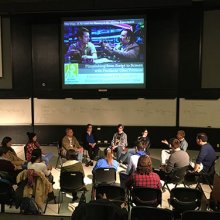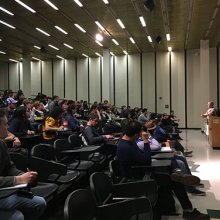Filmmaking from Script to Screen with Glen Trotiner
Special film screening of The Trust and Producer’s Talk
Special film screening of The Trust and Producer’s Talk

The Department of Art and Art History and the Alumni Association are proud to have kicked off the new Introduction to Film Studies Lecture Series with a special film screening and guest talk by film producer, director, and writer Glen Trotiner who is also a UAlbany alumnus (’79).

Known for his work on Hollywood blockbusters from Independence Day (1996) and Captain America (2011) to Phone Booth (2002) and The Trust (2016), Glen Trotiner has been the right hand man to a long list of prolific directors, including Amy Heckerling, Andrew Bergman, Terry George, James Foley, and Anthony and Joe Russo. He serves on the Board of Trustees of the Directors Guild of America Training Program which also helped launch his professional career in the film industry thirty years ago with work on Sidney Lumet’s Power (1986), followed by Brian De Palma’s The Untouchables (1987). Since then he has produced and worked on movies at all budget levels, including Big Daddy, Maid in Manhattan, What Happens in Vegas, Bella, The Last Holiday, Bernard and Doris, Reservation Road, and Vamps. Upcoming releases include Fam-i-ly, The Three Christs, Braven, The Wilde Wedding, and (now in theaters) The Promise.

Glen Trotiner received his BA and MS from UAlbany in the late 1970s, and is happy to return to campus with a special film screening of his recently co-produced film The Trust (2016) followed by a Producer’s Talk titled Filmmaking from Script to Screen. With the students, he discussed the making of that film and his personal and professional experiences in the film industry. In both the Q&A following his talk and the special master class provided to advanced film studies students prior to the public event, he highlighted the excitement and challenges of filmmaking as a collaborative and creative process, and provided students with candid advice and guidance.

This event was attended by 200 students and faculty from across the College of Arts and Sciences as well as the general public, including other alumni and even a few recent graduates who made the drive back to UAlbany from Brooklyn to hear Glen Trotiner speak. Students asked a range of questions, such as how one gets their start in the film industry, Glen’s advice for his own twenty year old self, what his dream project would be, what certain actors or directors were like to work with, the impact of a demanding shooting schedule, and the changing nature of movie exhibition from theatrical release to streaming online services. Glen encouraged students to listen well, to not wait to enter the film industry, to be prepared to work hard, and to not be afraid to ask questions and to learn from those with experience. He discussed the success rate of those entering the industry, and the value of the Director’s Guild of America Training Program.
This special event highlights the Film Studies minor in the Department of Art and Art History, and points to the growing Film Studies curriculum. Students from Prof. Segal’s Introduction to Film Studies, Poetry in Cinema, and Women in Film courses were in attendance, as well as students enrolled in other film-related curriculum across the campus such as Prof. Barney’s Studies in Film: David Lynch and His Others and Rob Edelman’s New American Cinema.

Upcoming courses in Film Studies include International Film Movements, Advanced Analysis of Film Form, Significant Cinema Directors: Wes Anderson and P.T. Anderson; Documentary Cinema, and a range of special topic courses like First Person Cinema and Cinematic Space: Landscape in Film. Further film-related courses are offered by the Departments of English, Communication Studies, Documentary Studies, East Asian Studies, and Women’s, Gender, and Sexuality Studies, among others. The Film Studies minor consists of Introduction to Film Studies and five additional film-related courses from across the College of Arts and Sciences, and can be combined with any major or double-minor.
Students also have the option of participating in the Peer Mentor Program in the Introduction to Film Studies course, or can seek out further Internships in Film Studies opportunities in the Capital Region for further academic credit. For information regarding the Film Studies minor, contact Dr. Shira Segal ([email protected]).
We thank Glen Trotiner for sharing his expertise with our students and academic community, and look forward to continuing the Introduction to Film Studies Lecture Series in Fall 2017.